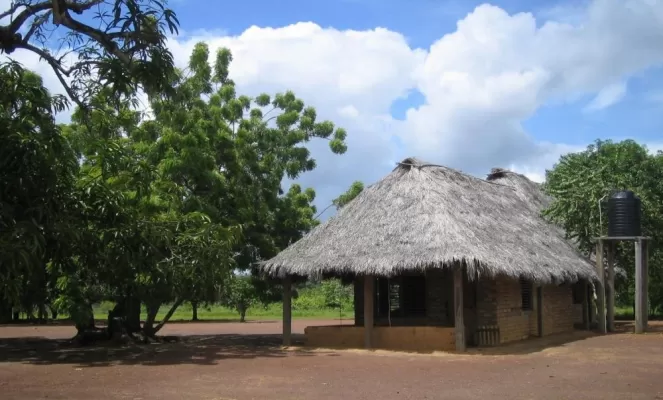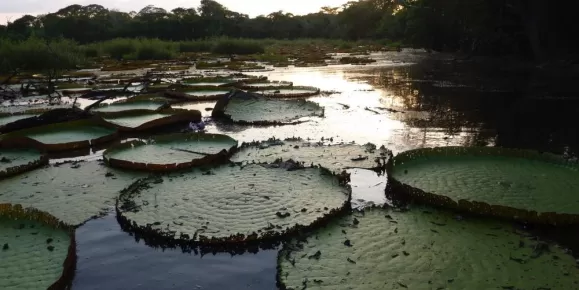Deep in the heart of Guyana, on the banks of the Rupununi river lies Karanambu. Since 1927 this has been the home of the McTurk family and a working cattle ranch.
The mission of Karanambu is to provide visitors with the opportunity to experience the wildlife of Karanambu and Simuni while enjoying the hospitality of the McTurk family and helping to conserve this extraordinary wetlands. Karanambu is situated on the Rupununi River with access to the Simuni River - one of the key wildlife and fishing areas in Guyana. Karanambu has a strong reputation of providing excellent viewing opportunities of Giant River Otters, Black Caiman and Giant Anteaters.
Karanambu is dedicated to conservation of the Rupununi savannah and wetlands ecosystem and preservation of the traditional way of life of the indigenous Amerindians who make the area their home. Karanambu is a nature lovers paradise and welcomes visitors to this remote corner of South America to experience its untouched natural beauty.
About Karanambu
Settled in 1927 by Tiny McTurk, Karanambu Ranch has been home to the McTurk family ever since. True to its origins, Karanambu remains a working cattle ranch on its 125 square miles of savannah land, worked by traditional vaqueros. The meat produced is completely organic and is either sold locally or consumed on the ranch.
The Karanambu Lodge
In 1983 Diane McTurk started the Karanambu Lodge eco-tourism resort allowing visitors to experience the tranquility and abundant wildlife that are key features of this part of the Rupununi. Guests are welcomed on to the ranch as friends, share meals with the family and enjoy guided tours according to their interests.
Accommodations
Accommodations at Karanambu consist of 5 traditional clay brick and thatched cabins. Four of the cabins can accommodate 2 people and include:
* Verandah with hammock.
* Private shower and toilet.
* Complimentary turn down and laundry daily.
The 5th cabin, suitable for families, can accommodate up to 4 people in two double/twin bedrooms with a shared verandah and bathroom.
* Water for bathing is provided from overhead tanks filled from the river.
* Drinking water along with other basic amenities is provided.
* Electricity is generated from 6-10 pm each evening.
* Bookings are accepted for a maximum of 12 people.
* Those traveling together should be prepared to share cabins if necessary.
Tours and Activities
With both the river and the savannahs close at hand there is a wide variety of activities to be enjoyed at Karanambu. Itineraries are not fixed and you are free to determine what you want to do based on your interests, the time of year and whether the guides have found anything interesting to see.
Typically there are two guided excursions each day. One early in the morning and another late in the afternoon and into the evening. As well as being the coolest times to be out, these are usually the best times to see the different birds and animals. Trips may be on the river by boat, on the savannahs by Land Rover or along forest trails on foot to the different ponds in the area. Activities usually include:
* Searching for wild otters along the river and among the ponds.
* Tracking a giant anteater across the savannah.
* Sipping rum punch while watching the a giant Victoria Amazonica lily blossom before your eyes.
* Boating through the flooded forest in the wet season.
* Enjoying the flora and fauna along the walking trails among the forest ponds.
* Spotting animals when they come out of hiding at night.
For an additional fee the following activities, which take you further afield, can be arranged.
* Sports/Novice fishing (catch limits are imposed).
* Visits to the giant termite mounds.
* Visits to the local Amerindian villages of Yupukari and Kwaimatta. If you are lucky you may see one of the local festivals.
* Caiman tagging with the research team based at Yupukari village.
* Overnight camp at Sumuni pond, a large pond connected to the Rupununi river and famous for its wildlife.
Wildlife
The Rupununi exhibits considerable diversity of rivers, streams, lakes, ponds, mountain, savannahs and forests leading to higher than expected species richness including over 600 species of birds, over 200 species of mammals, and over 500 species of fish. The Rupununi supports “vulnerable, endangered, or critically endangered species” including the Giant River Otter (Pteronura brasiliensis), Black Caiman (Melanosuchus niger), Arapaima (Arapaima gigas) and the Amazonian River Turtle (Podocnemis expansa) amongst others.
The Karanambu Trust
One of the attractions of Karanambu over the years has been hand-rearing young, abandoned Giant Otters (Pteronura brasiliensis) and re-introducing them into the wild. In 1997, as a direct result of this work, and the realization that the delicate ecosystem of the Rupununi savannahs needed to be preserved in the face of increasing development, the McTurk family founded the Karanambu Trust. The Trust is dedicated to preserving the ecosystem and wildlife as well as the traditional lifestyle of the indigenous Amerindians through the promotion and sponsorship of scientific research and sustainable economic development.

















